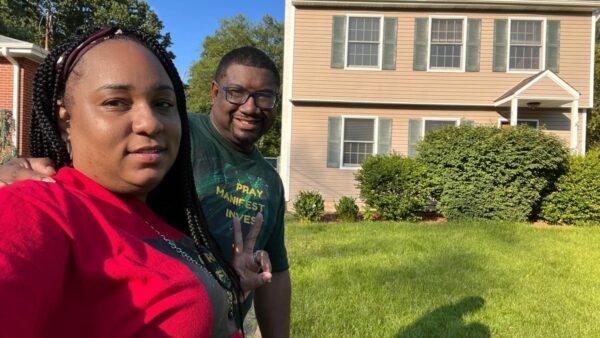Despite how high home prices have soared and how much mortgage rates have skyrocketed, I managed to buy a house in what some economists have called the worst time to buy in U.S. history.
I didn’t do anything particularly special to land my home. The only difference between myself and everyone still searching is that I vowed to keep putting in offers — no matter what. I placed offers for 18 homes in northern and central New Jersey. Everyone told me “no.” Each “no” was a huge disappointment, but I kept placing bids.

And perhaps that’s truly the key to buying a home in today’s market: shaking off the nos and being stubborn enough to keep going.
But aside from that pointer, here are the other tips that I’ve found matter the most when searching for a home in such a difficult environment.
Get a real estate agent. Trust me.
A friend recommended the real estate agent I used for my home purchase. I couldn’t be more happy with the job he did. You’ll want a real estate agent who is obsessed with getting you into a home. I would also recommend getting someone who wants to teach you about real estate throughout your home-buying process. Keep in mind that you might not pick the best real estate agent for you the first time. Don’t be afraid to fire your agent if the vibe isn’t right. The agent has to be someone you completely trust. If the person doesn’t answer your calls immediately or is leaving out information, tell him or her thank you and find someone different.
Bonus tip: Before grabbing a real estate agent, have a sense of where in the nation you want to move. You can say South Florida or upstate New York. I went specific. I told my agent that I needed a home in central New Jersey, specifically Union County, Middlesex County or Mercer County. You also want to decide what amenities you want the most — how many bathrooms, bedrooms, basement, etc.
The lender you choose matters
Assuming that your credit score is respectable and you have at least two years worth of work experience in the same industry, picking a mortgage lender is a big deal. I applied to three different lenders to see who would give me the best interest rate. You’re looking for the lowest rate you can possibly get and that only happens if you have a high credit score. Do not, under any circumstances, go with the first place that pre-approves you for a mortgage. Many first-time homebuyers make that mistake, and it hurts them in the long run once it’s time to see your actual monthly mortgage payment. Shop around and then pick the lowest rate you get.
Bonus tip: Once you’ve picked a lender, start getting your financial documents together immediately. You’ll need a couple years of pay stubs and a few months of bank statements. Some lenders even ask for tax returns. The faster you can pull this information together, the quicker your entire home buying process will go. I got lucky. I had a best friend and older brother who purchased homes before, so they whispered in my ear about getting my documents together.
Prepare for the rejection
The cost of home loans have been climbing aggressively as the Federal Reserve has bumped up interest rates in an attempt to combat inflation. Growing mortgage rates have knocked a lot of people out of the housing market, but that doesn’t mean it’ll be easy to get your offer accepted. Your real estate agent will place offers for you, and you will be told no over and over again. Prepare your mind for the rejection. The rejections have nothing to do with you personally. The home seller is trying to get the highest amount they can and finish the sale transaction in the simplest or quickest way possible. Know that someone who beat you for a home did so because they either offered a higher price or offered some other contingency that made the transaction go buy easier (like waiving inspection or waiving financing).
Bonus tip: One way I was finally able to get my offer accepted: I wrote a love letter to the sellers. In my letter, I told sellers what I loved about their home, why I wanted to purchase it and how the home will play into my large plans of starting a family. That seemed to hit a chord with them. Try writing a letter and ask your real estate agent to attach it to your offers. Make it no more than one page. Not every buyer you’re competing with will write a letter, so yours could be the distinguishing factor that gets you a yes.
‘Yes’ means the real work begins
Once a seller accepts your offer, don’t expect to start moving your things into the house right away. An accepted offer is followed by an appraisal, inspection, signing the purchase contract, loan underwriting and many other steps. This will easily be the most frustrating part of the process and that’s because you’re leaning on other people to do their jobs before you can actually get the house keys. Whatever technique you use for keeping your mind and nerves calm, you’ll need to ratchet that up by tenfold.
There will inevitably be some unforeseen issue that holds up your home buying process. In my case there were two major hold-ups.
I initially offered the sellers of my new home $340,000. When the appraisal came in at $303,500, I adjusted my offer to $313,500. It took the sellers roughly a week and a half (an eternity in real estate) to accept my new offer — for reasons I still haven’t been told.
My second hold-up came on the day I was supposed to close on the home. I was told that the sellers were apparently under contract with another buyer, which they weren’t supposed to do. The sellers had to go back, cancel the ongoing contract with those buyers and then make it clear for me to get the title to the house. That took another week to complete.
Hopefully, your hold-up won’t be like mine, but that’s why it’s really important that you get a real estate agent and lender who you like and trust. When I was going through all these starts and stops with the house purchase, my agent and lender kept me calm. They reassured me that I’d get the home and reminded me how happy I would be once I got the keys.
They were right, by the way. I closed on my home July 11 and moved my things in four days later. My wife and two cats have heralded me a hero ever since.
Bonus tip: Make sure your agent sets up at least two walkthroughs of the house. This is your opportunity to look at cracks in the walls, broken appliances, chipped paint and any other imperfections with the property. Mark down everything you see and then tell your agent to see if he/she can get the sellers to give you “credits” for those imperfections. For example, I noticed that the dishwasher didn’t work during my walkthrough and the sellers gave me $1,500 as a credit. I used it to buy this amazing new GE dishwasher.
Understand everything you’re paying
I cannot stress how important it is to save as much money as possible for your home down payment. When the sellers said yes to my offer, I was sitting on $60,000. I started the homebuying process with $50,000, but by the time someone finally said yes, I had amassed another $10,000. And that’s the takeaway here. Have a large amount saved once you begin, but keep saving aggressively until someone tells you yes. Even during contract negotiations and the appraisal and underwriting, keep saving. Believe me, keep saving.
Banks, lenders and social media will have you believe it’s OK to put just 3 percent or 3.5 percent of the home price as your down payment — and technically they’re right. But realize that the more money you can place for a down payment, the lower your mortgage will be. And if you keep saving while still going through the home search, you’ll have even more dollars to use for the down payment. That’s what I did. I placed 12 percent down and took the remaining amount of my $60,000 war chest to pay for minor renovations to the home like replacing the sump pump and installing a ventilation system in my attic.
Bonus tip: Keep your eye on the closing disclosure document (even if it’s an estimate and not the final one). Read the pages slowly and obsess over them. That document comes from your lender and it tells you exactly what you’re going to be paying for a mortgage plus property taxes and more. If there’s any line on that document that you do not understand, call your lender and have them explain it. I had a 30-minute-plus conversation with my lender one afternoon because some of the disclosure (the homeowner’s insurance part) didn’t make sense. I asked question after question (sometimes I purposely posed the same question a different way) until it made sense. I highly recommend this. Don’t just assume the document is correct and that you’ll understand it later.




